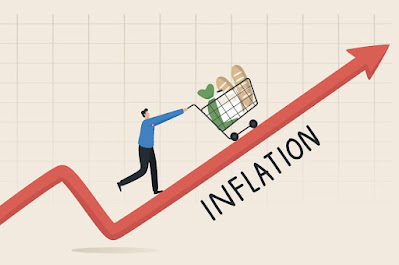Five Things You Can Do To Save On Groceries
There has been a lot of talk recently about cutting back expenses as things have gotten more expensive. With the Bank of Canada recently increasing interest rates, this has made borrowing more expensive. This includes mortgage and lines of credit. For example, our mortgage payment has increased by about $8 a week. That's a monthly increase of approximately $35. While a drop in the bucket for wifey and I, it's a huge amount for other households to absorb. One of the easiest ways to save money is on groceries. As a result, here are 5 things you can do to cut back on your grocery bill.
1) Don't Shop When You're Hungry
When you're hungry, you're more likely to put things in your cart that you wouldn't normally. All of a sudden, those bag of chips or that pre-prepared food tray looks extremely appetizing. Well, duh! It's because you're hungry. Instead, go grocery shopping after you have your breakfast or lunch. This way you won't pick up something you don't need.
2) Shop With Purpose (Have A Grocery List!)
Who goes to a grocery store unprepared? Well, seems a strong majority of people do. Not only do they do that, they tend to pick up things that they don't really need. They just pick it up because it looks good or it's something they think they could eat later. If you have a list, you're just going to purchase the necessities or the things your household will absolutely need to sustain itself nutritionally. Of course, you also need to make sure you vet the list before you leave the house. Just in case your young one surreptitiously adds cookies when you're not paying attention
3) Buy Things Only On Sale
When you buy your pork or beef when it's regular price, you're basically giving your money away. Regularly priced pork is 3 to 4 times the sale price. If you buy one pack of pork that weighs 8 pounds and costs $5.99 a pound, you're paying almost $48 for that slab of pork. However, if you wait for it to be on sale, that same slab of meat will be $1.99 (or less) a pound. Now you're paying $16 instead of $48! I can hear the complaining now... Well, we can't wait for pork/beef/meat to be on sale! We need to eat it! This brings us to our next point.
4) Buy in Bulk!
1) Don't Shop When You're Hungry
When you're hungry, you're more likely to put things in your cart that you wouldn't normally. All of a sudden, those bag of chips or that pre-prepared food tray looks extremely appetizing. Well, duh! It's because you're hungry. Instead, go grocery shopping after you have your breakfast or lunch. This way you won't pick up something you don't need.
2) Shop With Purpose (Have A Grocery List!)
Who goes to a grocery store unprepared? Well, seems a strong majority of people do. Not only do they do that, they tend to pick up things that they don't really need. They just pick it up because it looks good or it's something they think they could eat later. If you have a list, you're just going to purchase the necessities or the things your household will absolutely need to sustain itself nutritionally. Of course, you also need to make sure you vet the list before you leave the house. Just in case your young one surreptitiously adds cookies when you're not paying attention
3) Buy Things Only On Sale
When you buy your pork or beef when it's regular price, you're basically giving your money away. Regularly priced pork is 3 to 4 times the sale price. If you buy one pack of pork that weighs 8 pounds and costs $5.99 a pound, you're paying almost $48 for that slab of pork. However, if you wait for it to be on sale, that same slab of meat will be $1.99 (or less) a pound. Now you're paying $16 instead of $48! I can hear the complaining now... Well, we can't wait for pork/beef/meat to be on sale! We need to eat it! This brings us to our next point.
4) Buy in Bulk!
Recently, cheese was on sale at Fresh Co for $3.99 for 400g/450g bricks (actually, lowered even further to $3.75 last weekend). Did wifey and I just buy one? No way! Wifey and I picked up 8! Regular price for cheese is $5.99 or 7.99 depending on when and where you go. That's up to 50% off! The thing about cheese, as long as the package is sealed, it's good until the best before date. If you buy cheddar that date is at least 9-12 months in the future. Marble and mozzarella is at least 4-6 months in the future. When you do open a block of cheese, you can slice (or shred) it and store it in the freezer for an almost indefinite period of time! I say almost as most things will freezer burn given sufficient amount of time. However, in our family, cheese isn't something we need to worry about. I eat it daily. Baby girl also eats cheese now. This doesn't only apply to cheese. This applies to everything. Including meat. Instead of buying one pack when it's on sale. Buy up to the limit (or more)! Portion everything out and freeze it. Don't have enough freezer space? Buy a freezer chest. Usually, meat is good for at least 2-3 months in the freezer before it starts to freezer burn. Since we eat meat every day, it's not a big deal. If anything, recently, we've found ourselves running low on meat as they haven't been on sale as often. However, they were on sale two weeks ago. You can figure out what we did when it was. Additionally, when it comes to dried goods, you don't have to worry about storage. Rolled oats on sale at Costco for $5.99? Get 4 boxes! Rice on sale at No Frills? Get 8 bags! Flour at it's lowest price in years?! Get ALL the bags!! Seriously, though. Dried goods don't expire. There's a best before date. That date is just when the goods you're buying is at its freshest. Going past the best before date for dried goods won't hurt you. If anything, some things don't even come with a best before date. Instead, they come with a lot number. That usually means there is no best before date. However, if you've been saving that bag of rice or rolled oats for 5+ years, best to throw it out.
5) Look Through The Flyers (and Price Match!)
I don't know why people don't do this more often. Some people would rather do all their grocery shopping at one place. That's fine. Who wants to drive to 4 different stores to do groceries? I sure don't. At the same time, these people don't bother to price match. Seriously. Price matching can save you a lot even if it's just a few cents or a dollar each time. We try to avoid going to Food Basics for this reason. They don't have price matching. Instead, we shop mostly at No Frills and Fresh Co. The No Frills is closer and we have their credit card that gives 3% cashback, so it's a no brainer to go there. Why would I buy yogurt for $2.67 when it's $1.99 in a flyer at the other place? Another advantage of shopping at a store that price matches? Sometimes when a sale is especially good at another place, they will adjust the price automatically. When eggs were on sale for $1.88 at Food Basics, No Frills matched that price. When cherries were on sale for $1.67 a pound, our local No Frills had a big sign at the entrance advertising their adjusted price to compete with Food Basics. The only thing that's difficult to price match is meat. Everything has to be exactly the same in the flyer and what they have on the shelf. However, since you can save a lot of money on meat, the extra drive to these places is worth the trouble.
If you follow these steps, you're not going to save thousands of dollars a year. However, you will save a little bit of money. Possibly even enough to cover the cost of increases elsewhere in your life. If you're living paycheque to paycheque, you need to do something to start getting ahead of rising costs.




Comments
Post a Comment